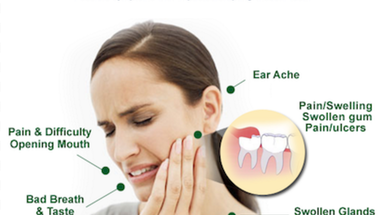Wisdom teeth are something most people have to deal with at some point in their lives. Statistics say that, although not everyone develops a third set of molars (i.e., “wisdom teeth”), about 90% of people do have at least one impacted wisdom tooth, which often leads to extraction to avoid infection, misalignment of surrounding teeth and a host of other difficulties noted below.
The Facts About Wisdom Teeth
Our ancestors tended to have mouths and very strong jaws because they ate most of their food raw. Over the centuries, however, our jaws became smaller as a result of dental care and a custom of primarily eating cooked food. Unfortunately, many of us still get that third set of molars, called wisdom teeth, but there’s often too little jaw space for those “extra” teeth. Hence, the teeth are unable to break through the gums, which causes them to become impacted below the gum’s surface.

Here are 5 unique warning signs that may be caused by impacted wisdom teeth:
- Mouth pain or stiffness
- Bad Breath or Taste
- Shifting of permanent teeth
- Pain or swelling in gums
- Swollen Glands
It’s wise to note that sometimes wisdom teeth cause problems that you may not feel. Wisdom teeth can lead to infections–studies show that approximately 25% of those with asymptomatic wisdom teeth develop gum disease (aka periodontal disease). When periodontal disease is left untreated, it can cause receding gums, gum pockets, bone deterioration and tooth loss. Studies show that periodontal disease can increase the risk for low birth-weight and premature babies, and to increase the risk of diabetes and heart disease.
The Bottom Line About Wisdom Teeth
If you’re having any of the above symptoms, schedule an appointment to see us. If we haven’t seen you in the past six months, schedule an appointment to see us. Sticking to a twice-yearly schedule of dental exams makes it possible for our Lower Manhattan dentists to keep a watchful eye on your dental health. Call us today at 212-267-1884. Your smile will thank you!

.png?width=800&name=Untitled%20design%20(3).png)

